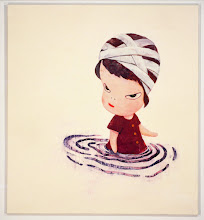 A friend and fellow dog/dog studies person alerted me to Sara E. Johnson's disturbing article in the latest issue of American Quarterly, on the widespread use of dogs in slave repression/anti-maroon warfare across the Americas in the 18th and 19th centuries, from Cuba to Haiti to Jamaica to the United States. The illustration here, depicting the goading and training of slave-hunting hounds, is from the English sea captain Marcus Rainsford's 1805 An Historical Account of the Black Empire of Hayti, one of Johnson's main sources. (Access to the full article is limited to institutional subscribers, unfortunately.)
A friend and fellow dog/dog studies person alerted me to Sara E. Johnson's disturbing article in the latest issue of American Quarterly, on the widespread use of dogs in slave repression/anti-maroon warfare across the Americas in the 18th and 19th centuries, from Cuba to Haiti to Jamaica to the United States. The illustration here, depicting the goading and training of slave-hunting hounds, is from the English sea captain Marcus Rainsford's 1805 An Historical Account of the Black Empire of Hayti, one of Johnson's main sources. (Access to the full article is limited to institutional subscribers, unfortunately.)I approached the article as a way of jump-starting my own on-going project on dog-human relations in the shadow of slavery. And what a jolt it was! I'm not a newbie to the general span of historical materials Johnson examines (see, for example, this study by John Campbell for comparison). But you just don't get desensitized to eye-witness accounts of dogs disemboweling human beings. Especially when you live with dogs.
Johnson gestures towards this deep cognitive and affective dissonance when she writes near the end:
… during the recent media frenzy surrounding NFL player Michael Vick and his dog-fighting ring, public outrage was palpable concerning the vicious, inhumane treatment of animals bred to fight and kill one another for their owners' profit. It is almost impossible for a contemporary audience to imagine that dogs were once similarly and purposefully abused in order to train them to attack human beings, all in the name of maintaining the slave economies that were the foundation of modern capitalism in the Americas.I find myself simultaneously objecting to this polarized framing of the history of dogs and racial slavery – that history is more complicated, as histories are wont to be, and as I’ve blogged about here, here, here - and appreciating its starkness and provocation. As someone who’s interested intellectually and personally in multispecies co-flourishing a la Donna Haraway, I feel more responsible than ever to do the most rigorous scholarship possible on alternative forms of sociality that enslaved people forged with the dogs that lived alongside them – alternatives not only to the extreme terror cultivated by slave regimes, but also the culture of sentimental pet-keeping that we inherited from the Victorian age.
I presented some of my preliminary findings and thoughts in the "Canine America" panel at the American Studies Association last October. I’m still revising the thing, but this paragraph - which follows a section that looks at the highly conventionalized representations of slave-hunts that circulated in the Abolitionist press in the US pre-Civil War, specifically those in Theodore Weld’s American Slavery as It Is - kind of gives a snapshot of where I’m at on this issue:
But the fugitives in the stories told by Weld’s informants are as much stick figures as the dogs: defenseless in the face of an implacable animal malevolence, they are utterly without power, agency, or the interspecies resource to deal with dogs. Accounts of “slave hunts” told by ex-slaves complicate such views of dogs as well as views of slaves. Interspersed among harrowing tales of failed escapes are many stories of failed pursuits. People describe throwing dogs off their scent by, for example, treating their shoes with various pungent substances, from peppers and herbs to dirt from freshly-dug graves.* Some fugitives are overtaken but manage to elude capture by misdirecting the dogs to keep chasing [e.g. here and here]. One WPA informant claims to know a fugitive who succeeded in “making friends” with the dogs sent to hunt him down, even traveling all the way up north with the dogs in tow [see page 2 of this narrative]. These modest tales of tricksterism give us glimpses into vernacular knowledge about dogs in slave communities – and, strikingly to me, the specific interplay of fear and familiarity that seems to animate this knowledge. In these stories, knowledge of how to interact with dogs, even to play with them, is inseparable from the knowledge of how to guard against them.
* Here I drew from both contemporary/antebellum and postbellum sources - will gather up some of these for a future post.







2 comments:
I totally thought of your project while reading this article--and while it's an important argument that Johnson makes about the transcolonial quality of training dogs to kill human slaves, your work is an important thinking through of those alternative structures of sociality between dogs and slaves! I can't wait to see it in print. I'd totally be happy to comment on drafts, too.
Hey Pylduck - thanks for this! Kathy Rudy invited me to present on this project at a brown bag lunch hosted by the Human/Animal Studies "camp" at Duke this summer. I'm looking forward to doing more archival work to see how my intuitions about alternative sociality bear out. My goal is to get something resembling an article together this summer - I'm totally going to take you up on the offer to read drafts! (It's so cool to finally be working on something that other people care about too, that isn't just some weird intellectual puzzle I constructed for myself...)
Post a Comment